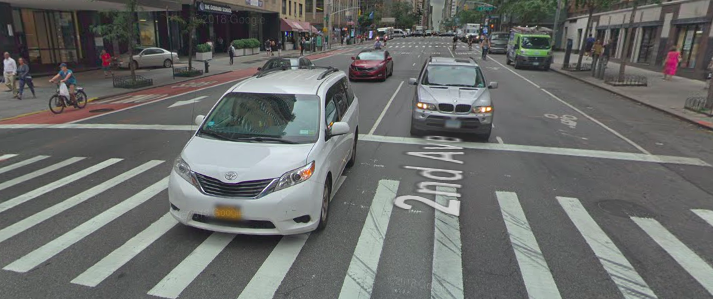A little good news, a little bad news.
City transportation officials have finally set a date for closing the last gap on the popular Second Avenue bike lane — only to reveal that the nine-block unprotected stretch between 43rd and 34th streets, where there are hundreds of crashes per year, won't be fixed until 2020 at the earliest.
The Department of Transportation said it can't start any earlier because of unspecified "construction in the area" being done by the Department of Design and Construction. The DOT has not presented any designs to the local community boards yet. The Department of Design and Construction didn’t respond to a request for comment.
The good news — that a completion date for the work has at least been set — came as officials celebrated finally completing the once-unprotected stretch of Second Avenue between 68th and 59th streets with safety improvements at the chaotic Manhattan end of the Queensboro Bridge.
At a ceremony marking the fixes, Manhattan Council Member Keith Powers applauded the city's work, but said now it's even more imperative to close the last remaining hole in the Second Avenue bike lane after the 19th cyclist was just killed this bloody year.
“This closure will minimize the risk of injury for all who travel in the area. Given recent traffic-related fatalities, we must take urgent steps to protect pedestrians and cyclists alike,” said Powers. “Now, it is equally imperative to close the remaining gap in Second Avenue between 43rd and 34th streets.”
Next year can not come soon enough since both areas, especially near the Queensboro Bridge, are prone to injury-causing crashes. Since July 2017, there have been 636 total crashes, causing 26 injuries to cyclists and 45 to pedestrians, on Second Avenue between 43rd Street and 34th streets. In the same time frame, there have been 842 crashes, causing 18 injuries to cyclists and 30 to pedestrians, between 59th and 68th streets.
Today @kiethpowersNYC and I cut the ribbon on new bike lane infrastructure in the #UES closing the dangerous gap at the mouth of the 59th Street Bridge. Cyclist can now bike down 2nd Ave without fear of a collision. Thanks @NYC_DOT @TransAlt @bikenewyork. @VisionZeroNYC pic.twitter.com/M7r102zpRf
— Ben Kallos, Former NYC Council Member (@BenKallos) August 16, 2019
The fixed nine-block bike lane gap still has a major flaw: it isn't fully protected because between 3 and 8 p.m. every day except Sunday, the eastern most lane of the roadway becomes a travel lane for cars headed to the 59th Street Bridge. As a result, many drivers try to park on what should be a protected by lane — forcing the NYPD to use sawhorses and police tape to keep cars out.
DOT told Streetsblog that it has no immediate plans to change the design.






